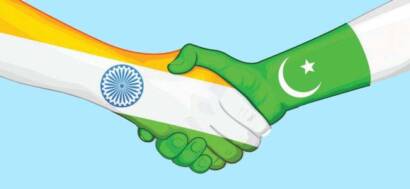 The Human race has always demonstrated its ability to develop a united front whenever faced with catastrophic circumstances. India and Pakistan are no such exception. I fervently believe that the coronavirus pandemic has presented a unique opportunity to resolve the disputes which continue to plague this relationship because for far too long people across both sides of the Indo-Pak border have traded barbs against each other. The time to set the relationship back on the path to reconciliation is now.
The Human race has always demonstrated its ability to develop a united front whenever faced with catastrophic circumstances. India and Pakistan are no such exception. I fervently believe that the coronavirus pandemic has presented a unique opportunity to resolve the disputes which continue to plague this relationship because for far too long people across both sides of the Indo-Pak border have traded barbs against each other. The time to set the relationship back on the path to reconciliation is now.
The recent observation by the Director General of Military Operations (DGMO) of both countries to strictly observe the ceasefire agreement signed by India and Pakistan back in November 2003 is a welcome first step. It is highly necessary that both the countries march to the respective public opinion of their respective countries which is strongly in favor of normalizing ties after remaining frosty for quite a while.
Fruits of Positivity
The late political scientist Samuel P Huntington in his magnum opus book ‘Clash of Civilizations and Remaking of World Order’ prophesized that the future of the world would manifest itself in clash of religions and civilizations. While this remained by and large true, it is time that both India and Pakistan turn this argument on its head and embrace each other.
Normalization of ties between India and Pakistan will carry a number of benefits-
Firstly, it is said that economics is the panacea for fixing rocky bilateral ties. The Indo-Pak relationship contains a lot of scope for increasing trade. Indian cement, cotton and sugar inter alia are in great demand in Pakistan and hence must be encouraged. Both India and Pakistan must restore the MFN (Most Favored Nation) status for each other as a commencing point to bolster bilateral trade.
Secondly, it will help India gain access to Central Asia which is a hydrocarbon hub which will give India a much needed boost to its fledgling oil and natural gas production.
Thirdly, it will help in bolstering people to people ties, helping people stranded across the border to gain access to their brethren which will help in healing old scars and wounds of partition and thereby develop a relationship akin to America-Canada.
Caveats Remain
Despite all the rosy possibilities of improving ties with Pakistan, persuading the Islamic republic to improve presents a unique conundrum in itself because of the dominance of the deep state in state. They certainly don’t believe in having good ties with India because animosity with India will drive northwards the allocation of the country’s vital resources for defence purposes. Tilak Devasher, a former bureaucrat and Pakistan expert articulates in his book, ‘Pakistan- Courting the Abyss’ that the Pakistan armed forces devour the lion’s share of the federal budget since the inception of Pakistan in 1947.
Another pressing concern is the Islamist threat in Pakistan, the potency of the threat lies in the recent negotiation that the Pakistan government was forced to engage in with the extremist Tehreek-e- Labbaik which has been demanding the expulsion of the French Ambassador for the last six months over the Laicite issue. They are akin to a time ticking bomb which threatens to tear asunder the already fragile social fabric of Pakistan.
But perhaps the most critical irritant in Indo-Pak ties is the use of terrorism as the state sponsored policy to try and achieve parity with India. Its tendency to distinguish between ‘good’ and ‘bad’ terrorists has been the single most point of contention in the ties for the last forty years and more. It is for this reason why the FATF (Financial Action Task Force) grey list has been hanging on to Pakistan’s fate like the Sword of Damocles. Whether Pakistan jettisons the use of this policy is a matter of pure speculation and is ultimately up to the Pakistani army and civilian elite.
Conclusion
India needs to be cautious while dealing with its recalcitrant neighbor, Pakistan has time again betrayed the trust of India which only enhanced the bellicosity of ties. Perhaps the mandarins in South Block will be better off treading cautiously while at the same time making the outreach to Pakistan.
-The writer is currently working as a Trainee Research Associate at Defence Research and Studies (dras.in) and is a columnist. The views expressed are personal and do not necessarily reflect the views of Raksha Anirveda








